- Home
- Peter Ackroyd
The Fall of Troy Page 7
The Fall of Troy Read online
Page 7
“I have lived that poetry. I have believed that poetry. When I was a boy in Furstenberg I was employed in a little grocer’s shop. Selling herrings and potato-whisky. That kind of thing. I shall never forget the evening when a drunken man came into the shop. His name was Herman Niederhoffer. He was the son of a Protestant clergyman in Roebel, but had grown unhappy with his lot. So he had taken to drink. Yet he had not forgotten his Homer. He recited to me about a hundred lines of the poet, with all their grand cadence. I asked him to recite them over three times, and each time I gave him a glass of whisky.”
“You told me that your father recited Homer to you.”
“And so he did. We are German, Sophia. We love the epics. They are part of our life.”
Later that day, Obermann took his horse. “I am going to Constantinople,” he told his wife. “I must seek wisdom from Ahmed Nedin.”
“TELL ME about Ahmed Nedin.” Sophia turned to Leonid, a few minutes after they had waved farewell to Obermann and watched Pegasus gallop over the plain.
“He is the curator of antiquities at the museum.”
“Our treasures here will find their way to him?”
“That is his wish, Frau Obermann. But you must ask your husband.”
It was with a certain foreboding, therefore, that she watched him disappear into the distance with a cloud of dust following the trail of his horse.
WITHIN THREE DAYS he had returned. He did not refer to the subject of the weapons, and did not discuss his visit to Constantinople. Instead he seemed more concerned with the imminent arrival of their visitor. “He is a professor at Harvard, Sophia. He has read of my work in the learned journals and has come to pay homage. We cannot turn him away.”
“And where will he sleep?”
“There is room in the village.”
“Those rooms are filled with bedbugs.”
“No matter. In the night, he can think. He can compose articles extolling our virtues.”
WILLIAM BRAND had travelled on the packet-boat from Constantinople, where he had been entertained for dinner one night by the American consul. Cyrus Redding had been in charge of the consulate for six years, and professed himself to be what he called a “Turkey fowl,” or Turkophile. He loved the wit and vivacity of the people around him. “There is no cleverer race on earth, sir,” he said to Professor Brand. “They beat all others.”
“They are smart. I give you that.”
“More than smart, Professor. They have an old spirit in them. You will see.”
“Do you mean the Ottoman?”
“No, sir. Much further back. Considerable further. You are a professor of ancient times, sir, and need no one to tell you.”
“Archaeology is not the same as ancient history, Mr. Redding. I wish it was sometimes.”
“I mean the Byzantines. And the Greek colonists. The land holds the legacy. Not the bloodline. The land holds everything.”
“Not just ruins?”
“Not just ruins.” The consul sipped the green tea that a servant had placed before him.
“Hold on a moment. By that reckoning you and I are part Red Indian.”
“I don’t doubt it for a minute.”
The conversation turned to the excavations at Hissarlik. “You must judge whether Obermann has found the fabled city. That’s your profession, sir. In my judgement it has been proved. He is a very remarkable man, sir. In some ways he is the most remarkable man of his age. I believe he has acquainted the world with archaeology. He has made it visible.”
“Oh, but we are not talking about a circus now,” Brand said. “These stunts of his—”
“Stunts? He found the gates and the tombs of Megalopolis. He sailed to Ithaca and found the palace of Odysseus.”
“He did not, Mr. Redding. He found some traces of a settlement. Nothing more.”
“Did he not? I figured he had. Well, in any case, he came here and by some darned instinct he located the lost city. ‘Dig here,’ he said. ‘It will be here.’ That man has genius.”
“He is pretty good at showing it, too. Some of my colleagues are considerably displeased with him. He makes them hopping mad. He makes them seem slow.”
“He is revered in these parts, Professor. They take pride in their history. They fancy the heroes of Troy to be their neighbours now.” He paused and looked steadily at William Brand. “I will tell you something about Obermann, though. Our men of genius may have flaws, may they not?” Brand nodded. “We are both Harvard men, you and I, so I can rely upon your discretion.”
“Indeed you can, Mr. Redding.”
“Obermann is an American citizen.”
“I did not know that.” William Brand put his hands behind his head and whistled. “I am mightily astonished, sir.”
“You will be more astonished when you learn that he falsified the time he spent in the United States. He bribed four witnesses, to our certain knowledge. He said he had spent five years. He spent four weeks.”
“Is that so? I’ll be damned.”
“Too late now to change it. It would look bad. I’ll tell you something else, too. Some months later Herr Obermann was buying up gold dust in Sacramento. He had a contract with a banker in San Francisco. But that contract was torn up. Obermann was sending the banker short weight. Nothing was proven in court since Obermann left before the lawyers got their hands on him. It is mighty interesting, though, is it not?”
“And this doesn’t stop him being a great man?”
“Oh, no, sir. It does not. I did not say he was a great man, in any case. I said he was a genius. His flaws make him more interesting.”
“They make him more suspect, Mr. Redding.”
“That isn’t my area. That is yours.”
“What do you expect me to do? Spy on him?”
“Nothing of the sort. Goodness me, he is an American citizen.”
“By chicanery.”
“Never mind. He is a countryman. But I would be mightily interested to know what he is doing down there. The museum people here are exercised about the lack of finds. They don’t like it. They believe he may be—how can I put it?—holding back—”
“Keeping the Trojan hoard for himself?”
“That is one way of putting it, Professor. I would not use your exact words.”
“So you want me to look around?”
“That is it. Look around. I would like you to keep your eyes open.”
NINE
When William Brand stepped off the boat at Kannakale he was greeted by Leonid, who took him at once in the cart to Hissarlik. “You have worked with Herr Obermann for long?” Brand asked him, as they rode over the plain.
“Many years, Professor. I had the honour to be with him in Ithaca. I have seen the house of Ulysses.”
“Not many can say that.”
“I think of it every day. Prof—” He stopped. Leonid had been advised not to call his employer “professor” in the company of William Brand. “Herr Obermann believes it was there that he slew the suitors of Penelope.”
“That is possible, sir, but not probable. I am sure Herr Obermann is aware of the difference.”
“Oh, yes! It was one of the first lessons he taught me. Divide et impera. Distinguish, and you will be master of your subject.”
“Good advice. What is that building over there?”
“Herr Obermann calls it our field hospital. We built it with our own hands from the stones of Troy. Mere rubble. But no finer use could be found for them. We place there all the villagers suffering from malaria. The swamps here emanate dangerous fevers, Professor. Pestilential miasmas. So he thought of this.”
“He is a benefactor.”
“He reverences the land. And so he reverences the people. Hissarlik is in sight.”
William Brand had seen many engravings and photographs of the scene, printed in the American newspapers over the past year. They had depicted the dunes of the ancient river Scamander, the villages on the plain, as well as the mound of Troy itself,
with its slopes and ridges and escarpments. Nevertheless, he was surprised by its dignity. That was the only word he could find for the effect it had upon him. He knew that it would be a place of busy, almost incessant, activity; even now, from this distance, he could see the workmen with their carts and pickaxes moving over the earth. He knew also the dirt and discomfort of any excavation. But there was an additional quality here. The curious notion occurred to him that, Troy being found, the earth had breathed a sigh of relief. It had given up its burden.
“You see, Professor, that we are working upon the entire site. Herr Obermann wishes for a complete picture of the city.”
“Is that wise, sir? Much depends on the patient examination of one area. There are so many levels that need to be thoroughly examined—”
“We are limited in time. Our permit lasts for only one more year. And then—who knows?—the English or the Swiss may come.”
“And steal your baby?”
“It is Herr Obermann’s baby. He found it. He adopted it. He gave it a name.”
“But then you must consider its true paternity, sir. The government of this region must judge who is allowed to come here.”
“Herr Obermannn will argue with you.” Leonid laughed. “And he has a wife who will join him. Frau Obermann has opinions of her own.”
“I had no notion that he was married.”
“Frau Obermann is a Greek woman. Young and beautiful, if I may say so.”
“Is she now?”
“But she works with us all. She does not sit in her tent, as Homer would say. She joins in the field work and the excavations. It was Frau Obermann who found the skeleton.”
“Skeleton?”
“Already I have said too much. You will meet her soon enough, Professor.”
IN FACT it was Sophia who greeted William Brand as the horse and cart came up to the mound. “My husband is occupied at the present,” she said in English. “I am your guide for an hour or so, Professor Brand. I hope that does not inconvenience you.”
“On the contrary, ma’am, it is very convenient. I had not expected so charming a companion.”
“But I am not erudite. I am not au fait with all the work.”
“I hear that you are at the centre of everything.”
“From Leonid? He exaggerates. May I bring you some coffee? It is only Turkish, I’m afraid.”
After they had finished their coffee, which William Brand found excessively muddy, she led him slowly among the pits and trenches. “We have found six levels,” she told him. “Six different settlements over a period of two thousand years. Each time the city was rebuilt on the partial ruins of its predecessor.”
“That is decidedly queer.”
“Monsieur Lineau—you will meet him later—has a theory about it. He believes that the city had some sacred image, or some sacred space, that had to be preserved. The city was here to protect it.”
“I know of no other city like it, if that is the case. Except that my colleagues in Mexico have found a strange city of temples that defies explanation. Maybe Troy is related.”
“No. It is singular, Professor Brand. It is the original. My husband is very clear about that. It is the first city.”
“That’s too much speculation for me, ma’am. I like to see the material with my own eyes. I like to feel the stone with my hands.”
“Then look around you. You will see everything. In this trench, to your right, you will see signs of calcination. My husband believes that we have uncovered a portion of a tower from the second city. He believes it to be part of the burned and ruined city of Homer. The pottery here is of a lustrous red, unique to this level. But you will soon read that in your newspapers.”
“Indeed. At home it is a matter of great excitement and debate. But I would like to see the evidence.”
“Polemon, who lived in the second century before Jesus Christ”—she bowed her head at the sacred name—“came to Troy. He remarked that he had seen there the identical altar of Zeus on which Priam had been slain. He had also seen the stone upon which Palamedes taught the Greeks to play at dice. That is evidence of the monuments to be found here, is it not?”
“You are remarkably well informed, Mrs. Obermann.”
“I have a good teacher.”
“I would say that you are more learned than my graduates.”
“Oh, no. Not learned. I have been able to pick up scraps of knowledge very quickly. My husband is continually explaining matters to me. He is helping me all the time.” She suddenly ceased to be serious, and laughed at his bemusement. “You do not believe a female can speak of Polemon and ancient Troy. Is that it?”
“Oh, no, ma’am. That is not any cause of astonishment. I am just considering how a pretty young woman can be so in love with mud and stone. Forgive me. Yankee plain speaking.”
“I am not in the least offended.” She laughed again. “I surprise myself sometimes, Professor Brand. Let me show you the outer wall.” She led him to an outcrop of stones that had been fashioned to fit one another without mortar. “In the legend, of course, this wall was built by Poseidon and Apollo.”
“Or by Poseidon alone.”
“You recall the passage? ‘I built a wall broad and fair, so that the city might not be taken.’”
“You have a fine memory, Mrs. Obermann.”
“I study that book. I almost have it by heart now. My husband reads it to us every evening, and then I go back to the words themselves. To the original Greek.”
William Brand was already half in love with Sophia Obermann, although he would not have admitted this to himself; he led a bachelor existence in Harvard University, where he lived in a white wooden-framed house in a street off the Green. He was a tall, lean man, redolent of the New England family from which he came; he had the slight stiffness, the exaggerated politeness, of his stock. He exhibited what Bostonians regarded as “rectitude,” an uprightness of manner and straightness of dealing. He was not effusive. He did not have what he called “the New York bounce,” by which he meant a certain snappiness and glibness. He had never married because, as he told his friends, he did not know how to “go about” a courtship or proposal; he was, in effect, too shy. On any topic concerned with his subject, however, he was precise and even on occasions argumentative. His politeness, in his profession, was limited. In private he cursed the strictness of his upbringing, yet on Sundays he still always worshipped at the Unitarian chapel.
Now with Sophia Obermann, on the windy mound of Troy, he found that he could speak freely. “I read Homer as a child,” he said, “in Longfellow’s translation. Our American poets have a fine line in exuberance, but I think Mr. Longfellow was thinking of Red Indians rather than of Trojans.”
“Did you never study Greek?”
“Oh, yes. It was drilled into us at Deermount—that was my school—until we ate and drank Greek. Yes, ma’am, we knew our Greek. I remember our master saying that the Greek victory against the Persians was more important in human history than the American defeat of the British. That shook us up a bit. But we never doubted it.”
“I have studied the history of my people, too. But only now—”
“Is it coming alive for you?”
“That is the phrase. Coming alive. This is what I wanted to show you. You see these lines just inside the wall?” She showed him a rectangular section of stone, barely emerging out of the earth. “It is a different material from the wall. It is of marble. I believe it to be an altar built against the wall as a holy defence.”
“There were such altars, ma’am. I give you that.”
“And I believe I know what altar it is. It is the altar of Ate mentioned by Lycophron and by Apollodorus. She is strong and swift. She walks with light, soft feet over the heads of men. We know that she was worshipped on this hill by the Trojans, and what better place for the goddess of strength than the wall itself?”
“It is a theory. If I put you in front of a class of Harvard men, they would believe you in a minute
. You have considerable conviction, if I may say so. But it is only a theory.”
“I grant you that, Professor. But are theories not sometimes beautiful?”
“Not if they get in the way of facts.”
She stamped her foot upon the ground. “But this is the fact.” He feared that he might have upset her. “I am not angry. I am merely stating that this earth beneath our feet is a fact. We have too many facts. We have not enough theories.”
“Well, ma’am, that is unusual. In my profession it is generally the other way round.”
“Ah, here is my husband.”
Obermann had come on to the plateau behind them. “I have found it, Sophia!” He hastened over to them. “Forgive me, forgive me, Professor Brand, for not greeting you more formally. I am Obermann.” He bowed and shook the American’s hand. “Welcome to our little city. I have found it, Sophia! You have come on a day, Professor, that will go down in the annals of archaeology. I have found a Trojan sword! I have found a bronze sword!”
“That is wonderful news, Heinrich.” Sophia was looking expectantly, almost curiously, at her husband. “You had almost given up hope of discovering such a thing.”
“Never give up hope! Is that not right, Professor? Do you not teach that at Harvard? Never give up hope of finding marvels.”
“I would be highly interested in seeing this sword, Mr. Obermann.”
“You will be the first among all your colleagues to gaze upon it. Come. We will approach the long-lost wonder.”
He led them towards the other side of the hill, looking east. As they walked across the area of excavation, he was very gleeful. He pinched Sophia’s arm and blew her a kiss. “Oh, Professor,” he said. “Watch where you are walking.”
“Pardon me?”
“I mean it literally. Watch. Observe. Do you notice anything about the track?”
“I see limestone.”
“Yes. Good. You see flags of limestone, actually. It is an ancient street. But what else do you see?”
“Nothing.”
Obermann laughed. “Good. Very good. Nothing. That is precisely what I see. Nothing.” He laughed out loud again. “And what do you deduce from that, Professor?”

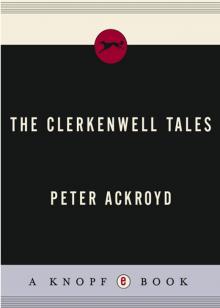 The Clerkenwell Tales
The Clerkenwell Tales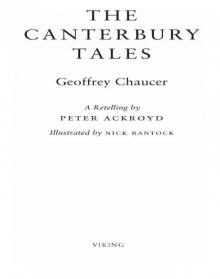 The Canterbury Tales
The Canterbury Tales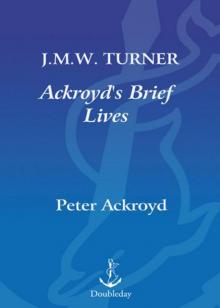 J. M. W. Turner
J. M. W. Turner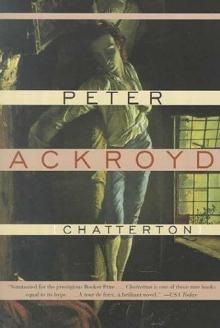 Chatterton
Chatterton The Canterbury Tales – A Retelling
The Canterbury Tales – A Retelling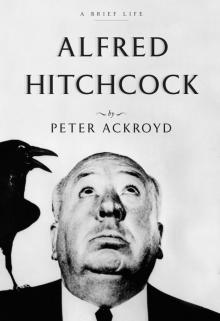 Alfred Hitchcock
Alfred Hitchcock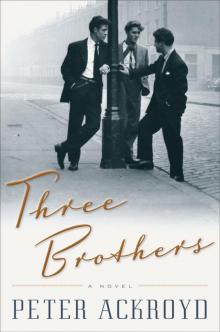 Three Brothers
Three Brothers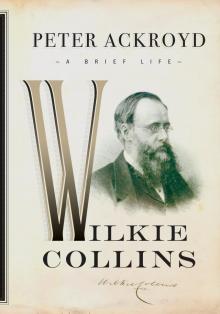 Wilkie Collins
Wilkie Collins Venice
Venice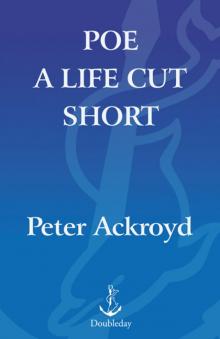 Poe
Poe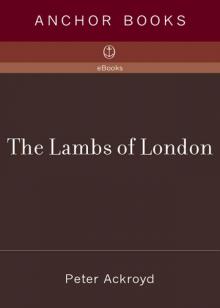 The Lambs of London
The Lambs of London London
London Queer City
Queer City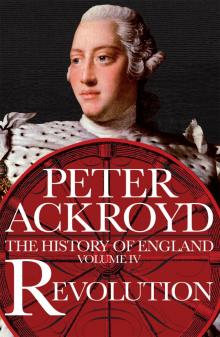 Revolution, a History of England, Volume 4
Revolution, a History of England, Volume 4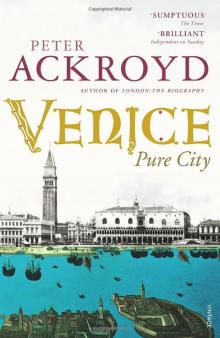 Venice: Pure City
Venice: Pure City Foundation
Foundation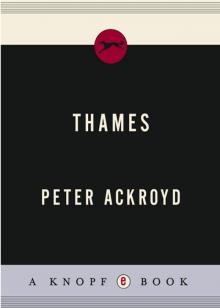 Thames
Thames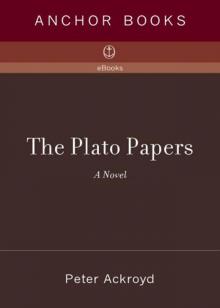 The Plato Papers
The Plato Papers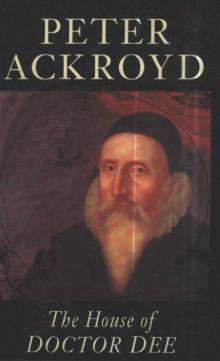 The house of Doctor Dee
The house of Doctor Dee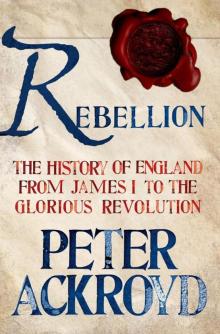 Rebellion: The History of England from James I to the Glorious Revolution
Rebellion: The History of England from James I to the Glorious Revolution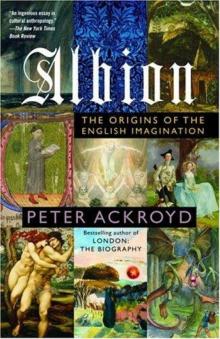 Albion: The Origins of the English Imagination
Albion: The Origins of the English Imagination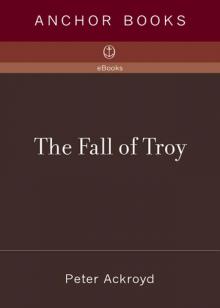 The Fall of Troy
The Fall of Troy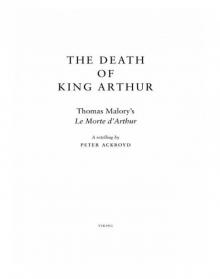 The Death of King Arthur
The Death of King Arthur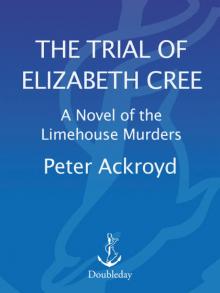 The Trial of Elizabeth Cree
The Trial of Elizabeth Cree London: The Biography
London: The Biography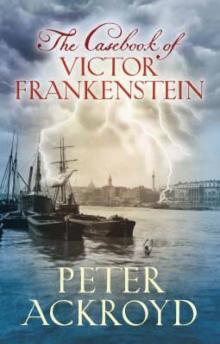 The Casebook of Victor Frankenstein
The Casebook of Victor Frankenstein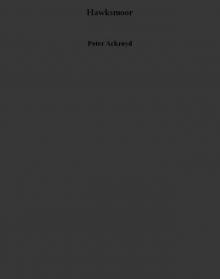 Hawksmoor
Hawksmoor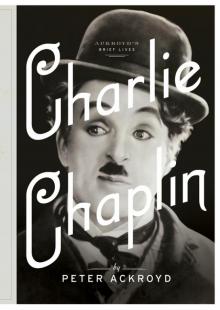 Charlie Chaplin
Charlie Chaplin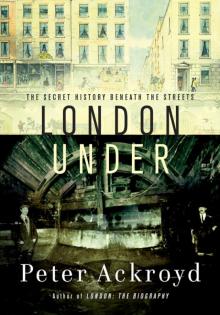 London Under
London Under